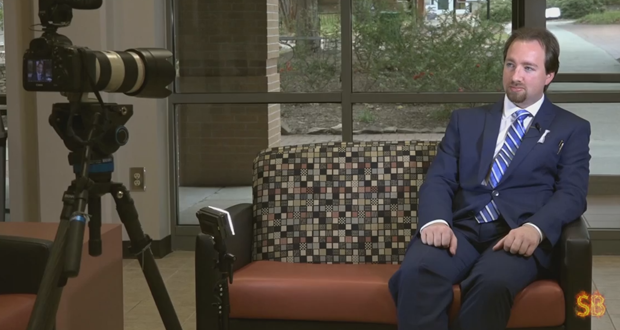I was recently interviewed via email by Marnie Eisenstadt at Syracuse Media, who wrote a full-length article about my stance on “affirmative consent” policies. She misquotes me a little bit in the third paragraph (you can see how the way she leads in to my answer in her article doesn’t match up to how she leads in to my answer in our interview), but the rest of it is pretty accurate.
Overall, I’m grateful she took the time to interview me. As usual, the comments on the article are mostly in favor of my stance. Below is the full Q&A session.
1. How Does Affirmative Consent Affect Male Students Differently Than Female Students? Why?
Affirmative consent policies tend to trivialize or deny the impact of body language in demonstrating consent, sometimes strongly suggesting that verbal consent is necessary. A school that defines consent in such a way will unreasonable expand the definition of sexual assault in a way that will inevitably punish the wrongly accused and open the door for false accusations (which in turn harm victims of sexual assault).
Some affirmative consent policies are also bundled with other elements that further weaken due process. For example, California’s affirmative consent law SB 967 also requires by law that universities use a “preponderance of evidence” standard in adjudicating sex-assault accusations. This is a low standard of evidence that – when combined with a strong lack of numerous other critical safeguards afforded the accused in both civil and criminal trials – has no place in any official adjudication of sexual assault.
2. Do You Have Any Examples of How This Has Gone Awry Elsewhere? Lawsuits?
I am not aware of any lawsuits that have occurred concerning affirmative consent policies (likely because their widespread adoption is somewhat of a new thing), but that does not necessarily mean they have not been filed. We are always looking for new information to expand our lawsuits database. As more schools adopt these policies, the probability significantly increases that we will see a lawsuit against the school in the future.
3. What Would Be a Better Way of Addressing College Sexual Assault?
Let the professionals in the criminal justice system handle sexual assault. They have far greater investigatory and prosecutorial power than campus bureaucrats. Also, the very nature of the criminal justice system gives the topic of sexual assault the sense of gravity that the nature of the crime requires; for example, universities refer to sexual assault as “student misconduct,” a characterization that minimizes the gravity of a victim’s experiences.
Anti-due process advocates often paint a picture of a justice system that almost never convicts rapists even when strong evidence suggests otherwise. They then use this as a rationalization to erode due process, but oftentimes these claims are either flat out untrue or are radical distortions of the truth.
4. Can You Give Me a Little Background About Yourself, Your Website and a Pic of You?
I’m a former English instructor in the A&M system. I founded my website and organization to fill a vacuum in the public conversation on educational equity. Lately, I have worked to recruit and network with people to build critical resources that advocates across the United States can use. For attorneys and advocacy groups concerned with due process, for example, I have constructed our lawsuits database.
Here is a picture of me from a keynote presentation at the KSU Male Students in Peril conference last year.
Thank You for Reading
If you like what you have read, feel free to sign up for our newsletter here:
About the Author
Related Posts
One Comment
Comments are closed.
I was recently interviewed via email by Marnie Eisenstadt at Syracuse Media, who wrote a full-length article about my stance on “affirmative consent” policies. She misquotes me a little bit in the third paragraph (you can see how the way she leads in to my answer in her article doesn’t match up to how she leads in to my answer in our interview), but the rest of it is pretty accurate.
Overall, I’m grateful she took the time to interview me. As usual, the comments on the article are mostly in favor of my stance. Below is the full Q&A session.
1. How Does Affirmative Consent Affect Male Students Differently Than Female Students? Why?
Affirmative consent policies tend to trivialize or deny the impact of body language in demonstrating consent, sometimes strongly suggesting that verbal consent is necessary. A school that defines consent in such a way will unreasonable expand the definition of sexual assault in a way that will inevitably punish the wrongly accused and open the door for false accusations (which in turn harm victims of sexual assault).
Some affirmative consent policies are also bundled with other elements that further weaken due process. For example, California’s affirmative consent law SB 967 also requires by law that universities use a “preponderance of evidence” standard in adjudicating sex-assault accusations. This is a low standard of evidence that – when combined with a strong lack of numerous other critical safeguards afforded the accused in both civil and criminal trials – has no place in any official adjudication of sexual assault.
2. Do You Have Any Examples of How This Has Gone Awry Elsewhere? Lawsuits?
I am not aware of any lawsuits that have occurred concerning affirmative consent policies (likely because their widespread adoption is somewhat of a new thing), but that does not necessarily mean they have not been filed. We are always looking for new information to expand our lawsuits database. As more schools adopt these policies, the probability significantly increases that we will see a lawsuit against the school in the future.
3. What Would Be a Better Way of Addressing College Sexual Assault?
Let the professionals in the criminal justice system handle sexual assault. They have far greater investigatory and prosecutorial power than campus bureaucrats. Also, the very nature of the criminal justice system gives the topic of sexual assault the sense of gravity that the nature of the crime requires; for example, universities refer to sexual assault as “student misconduct,” a characterization that minimizes the gravity of a victim’s experiences.
Anti-due process advocates often paint a picture of a justice system that almost never convicts rapists even when strong evidence suggests otherwise. They then use this as a rationalization to erode due process, but oftentimes these claims are either flat out untrue or are radical distortions of the truth.
4. Can You Give Me a Little Background About Yourself, Your Website and a Pic of You?
I’m a former English instructor in the A&M system. I founded my website and organization to fill a vacuum in the public conversation on educational equity. Lately, I have worked to recruit and network with people to build critical resources that advocates across the United States can use. For attorneys and advocacy groups concerned with due process, for example, I have constructed our lawsuits database.
Here is a picture of me from a keynote presentation at the KSU Male Students in Peril conference last year.
Thank You for Reading
If you like what you have read, feel free to sign up for our newsletter here:
About the Author
Related Posts
One Comment
-
Hey Jonathan,
A conservative website addresses university speech codes and the injustice to male students in US (quoting A Voice for Men):
http://www.americanthinker.com/articles/2015/07/tyrants_and_snowflakes.html
“As one male group complains:
College campuses are among the least tolerant places in America. Smug, elitist
faculty gravitate to the easily mouthed clichés of feminism and other
forms of political correctness to give them a false veneer of
enlightenment and sophistication, and to separate them from the “guns
and religions” crowd they find so abhorrent. This veneer arms them with
McCarthyistic bats to attack anyone who doesn’t share their world view.”Read more: http://www.americanthinker.com/articles/2015/07/tyrants_and_snowflakes.html#ixzz3gMjVVGkN
Follow us: @AmericanThinker on Twitter | AmericanThinker on Facebook
Comments are closed.
More from Title IX for All
Accused Students Database
Research due process and similar lawsuits by students accused of Title IX violations (sexual assault, harassment, dating violence, stalking, etc.) in higher education.
OCR Resolutions Database
Research resolved Title IX investigations of K-12 and postsecondary institutions by the Department of Education’s Office for Civil Rights (OCR).
Attorneys Directory
A basic directory for looking up Title IX attorneys, most of whom have represented parties in litigation by accused students.







Hey Jonathan,
A conservative website addresses university speech codes and the injustice to male students in US (quoting A Voice for Men):
http://www.americanthinker.com/articles/2015/07/tyrants_and_snowflakes.html
“As one male group complains:
College campuses are among the least tolerant places in America. Smug, elitist
faculty gravitate to the easily mouthed clichés of feminism and other
forms of political correctness to give them a false veneer of
enlightenment and sophistication, and to separate them from the “guns
and religions” crowd they find so abhorrent. This veneer arms them with
McCarthyistic bats to attack anyone who doesn’t share their world view.”
Read more: http://www.americanthinker.com/articles/2015/07/tyrants_and_snowflakes.html#ixzz3gMjVVGkN
Follow us: @AmericanThinker on Twitter | AmericanThinker on Facebook